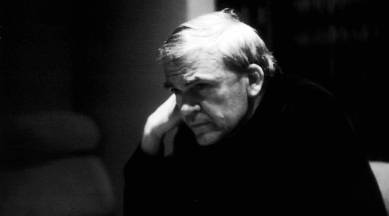Milan Kundera, author of ‘Unbearable Lightness of Being’, dies at 94
Kundera escaped persecution, satirised dictators, and even supported a convicted sex offender, all with the nib of a pen that has finally been laid to rest

“Every one of my novels could be entitled The Unbearable Lightness of Being or The Joke or Laughable Loves; the titles are interchangeable, they reflect the small number of themes that obsess me, define me, and, unfortunately, restrict me. Beyond these themes, I have nothing else to say or to write.”
This was Milan Kundera’s response to a question on the themes he has revisited throughout his fiction, in a 1984 Paris Review interview, shortly after the publication of The Unbearable Lightness of Being.
monthly limit of free stories.
with an Express account.
The lifelong acclaim he got for exploring the politics and philosophies of his homeland, Czechoslovakia, in the shadow of communist regimes, a pursuit that elevated him to a favourite for the Nobel Prize for Literature apart, Kundera remained a fierce champion of plot, of excitement and of entertainment and story in literature. He escaped persecution, satirised dictators, and even supported a convicted sex offender, all with the nib of a pen that has finally been laid to rest.
He died Wednesday at the age of 94, after a long unspecified illness, his French publisher Gallimard confirmed.
Kundera was born in the Czech city of Brno in 1929, just a decade before German occupation. His father was a musicologist – an influence apparent in works like The Joke (1967), his first novel, about boyhood in communist Czechoslovakia, wherein he inserted musical excerpts and musicological theories into the story. He was also a fan of Czech composer Leoš Janácek and Hungarian composer Bartók, and frequently inferred his stories as a collection of architectures and rhythms.
Kundera acquired leftist credentials by his teenage years when he joined the Communist Party of Czechoslovakia and was soon expelled for “individualistic tendencies”. In 1975, he left the country for France with his wife, after facing opposition for his criticisms of the Soviet invasion of Czechoslovakia.
A few years later, he wrote his most famous work, The Unbearable Lightness of Being, a story of a young couple and their dog living under the same Soviet invasion. The ‘lightness of being’ is (arguably) a response to Nietzsche’s notion of the universe existing endlessly in a loop, with everything having already happened the way it is. Some characters struggle under the weight of Nietasche’s doctrine, whereas others believe everything happens only once – hence the light weight of existence.
Kundera was inspired by writers like Franz Kafka, Martin Heidegger, Laurence Sterne and Miguel de Cervantes, an influence apparent in the tragicomic and self-referential plots of his novels. He frequently compressed poetry, treatise, essay and fiction into the same composition, earning fervent admirers and critics.
He ran into controversy in 2009 when he signed a petition supporting the release of convicted sex offender and Polish filmmaker Roman Polanski after he was arrested in Switzerland in connection to his 1977 charge for drugging and raping a 13-year-old girl.
He also faced criticism in the Czech Republic for being a “police informer”, when news broke that he was being investigated by a state agency for turning in an alleged acquaintance to the Czech secret police in 1950. Kundera denied the charges and many world-famous writers like JM Coetzee, Salman Rushdie, Gabriel Garcia Marquez, Philip Roth and Orhan Pamuk came to his defence.
📣 For more lifestyle news, follow us on Instagram | Twitter | Facebook and don’t miss out on the latest updates!